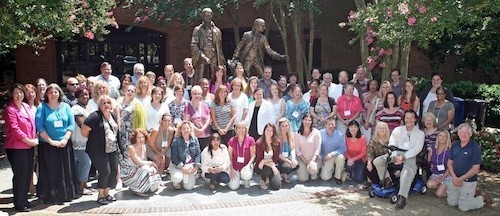
Graduating Class ISEA 2013
ISEA, a five-day training program, scheduled from August 3-8, 2014 will be hosted by the William & Mary School of Law and co-sponsored by PELE Special Education Advocacy Clinic, Wrightslaw, and Oklahoma Disability Law Center. The program will be held at The William & Mary School of Law, located at 613 South Henry Street in Williamsburg, Virginia.
Applications for 2014 are open and will be considered on rolling basis bi-monthly, from February 1, 2014-June 30, 2014. Attendees are selected by an application process.
The purpose of this program is to provide training in special education advocacy for experienced advocates, law students, new attorneys, and attorneys who are new to special education law. The program will include 25 sessions on applicable laws, ethics, best practices in advocacy, strategies in working with parents and schools, and dispute resolution procedures, taught by national leaders in the field.
Topics to include and not limited to:
History and Applicable Laws
Ethics in Special Education Advocacy (CLE credit)
Introduction to Legal Research
Case Review and Analysis
Understanding Evaluations, Tests and Measurements
Individualized Education Programs (IEPs)
Section 504
Eligibility
Behavioral Issues at School
Discipline
Juvenile Justice
Negotiating with Schools – Getting to YES!
School Perspectives
Strategies for Working with Schools
Strategies for Working with Parents
Dispute Resolution and State Complaints
Experts as Fellow Advocates
Preparing a Case for Trial/Due Process
Using Evaluations, Tests and Measurements as Evidence
Evidence Strategies
Legal Claims and Remedies
Creating Systemic Change in Your State
For all training information to include credits, application fees, please click here!





I do not understand why legal aid does not represent disabled children that lose their IEP’s in schools wrongfully, or do not have IEP’s and their parents feel they need one. This means that disabled poor children are left without representation, and stand to lose other important services they have, like services through Community Mental Health, or even Social Security benefits. Furthermore, with one out of 88 children now being diagnosed with autism spectrum disorder, not to mention all the other disabilities, why are teachers not being educated to understand disabilities? How can teachers be an important part of an IEP or 504 meeting if they do not know how to recognize a disability?! How many students have to get treated poorly or fail in the schools before something changes?